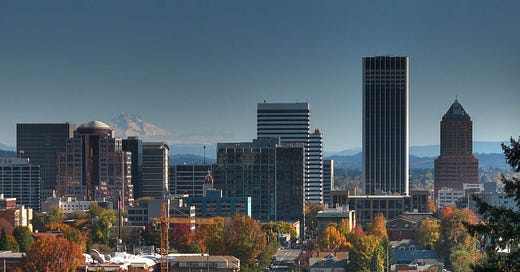Will eight be enough attempts to improve Portland's form of government?
The Charter Commission once again is poised to recommend changes in how Portland government is structured, a correction that is overdue
"Downtown Portland HDR" by fusionpanda is marked withCC BY-NC 2.0.
When I first moved to Portland in 1999 to attend Portland State University, the city’s motto emblazoned across city municipal vehicles read “the city that works.” And in the 1990s I felt like the city was, indeed, working to center citizens to deliver effective, accountable constituent services. Flash forward twenty-plus years and increasingly Portlanders feel the city no longer works for its citizens, with many pointing the finger at the way we govern ourselves as the main problem.
Portland is the only major city in North America that’s governed by at-large-commissioners who manage the numerous bureaus built to serve Rose City citizens. In this system the mayor is another commissioner - another vote – with the only distinction being the ability to dole out bureau assignments to their fellow elected commissioners.
There’s a dearth of professional policy expertise (aka technocrats), and bureaus are managed, rather scleroticly, by elected partisans, political appointees and skads of unelected, unaccountable staffers that do much of the heavy lifting. As a former State Department democracy specialist, I can tell you that when operational bureau directors respond and report directly to political appointees, ossified policies that decenter citizen concerns usually follow.
There is little incentive in the at-large-commissioner model to coordinate or collaborate across bureaus, which have devolved into balkanized silos. Since commissioners are “at-large” they often are in a reactive crisis management posture where leadership and innovation take a back seat to answering the mail of the immediate.
Portland’s commission form of government was constituted in 1913 and since then Portlanders have been presented with no fewer than seven opportunities to formally change the way we govern ourselves. The previous seven attempts to reform Portland’s governance structure failed. This November, Portlanders will decide whether enough’s enough and vote to reform our (ahem) unique form of self-government.
In March, Portland’s Coalition of Communities of Color hosted an open forum event to update citizens on the work of the Portland Charter Commission - the body charged with making recommendations that citizens will ultimately vote on. While liberal democracy has taken a beating of late, it’s refreshing to see such a transparent, inclusive process. Portlanders not only want to know how the sausage is and increasingly want to be part of the process.
What are the solutions the commission is considering? It’s difficult to predict precisely what recommendations are coming, but it's clear change will be on the ballot this fall and the outlines of these proposals are coming into focus.
More Commissioners, More Districts
Currently there is roughly one Commissioner per 200,000 Portlanders - a far cry from the Charter Commission’s stated “sweet spot” of one representative per 50,000 citizens. To address the leadership vacuum there is energy around expanding the Council from 5 Commissioners to perhaps as many as twelve.
The expansion of cheeks in government seats means multimember districts that, in theory, would add more diverse, representative voices while spreading the division of governance more equitably. Twelve representatives would get Portland to the 1:50,000 representative sweet spot.
Portland’s elected leaders historically come from the west side. Multimember districts have the potential to defuse political power throughout the city - especially to the east side.
Enter the City Manager
With increased membership in the club of leaders comes calls for increased professional, transparent oversight management. Enter the city manager, a revolutionary role for Portland that the Charter Commission is most likely to recommend. City managers would exist parallel to a reformed mayoral role to implement the will of the expanded City Council. A city manager would inject more non-partisan, professional expertise into bureau administration that, in turn, could deliver more effective constituent services and make Portland the city that works.
Whither the Mayor?
If the Charter Commission recommends a city manager, which I bet they do, the mayor’s job description will have to change. Portland’s mayor will essentially be the CEO of the city, accountable to both voters and the expanded Council. Under this system, an “executive” mayor would deliver on the policymaking and legislative priorities of the City Council.
The mayor would have the authority to hire/fire the city manager, but only with the City Council’s consent. These reforms could also open the door to more professional technocrats with bureau specific skills and expertise to help Portland work again.
Ranked Choice Voting
Portland voters will also decide on whether we should change the mechanics of how votes for the mayor and Council are actually cast. Portland, like a majority of U.S. towns, cities, and states, has a first-past-the-post system where the candidate with the most votes wins.
Under ranked choice voting (RCV), voters “rank” their top three choices for the Council - what democracy analysts call a proportional system. Proponents of RCV claim the approach engenders more cooperation and moderation among candidates.
Under RCV, if no candidate receives a majority of votes after counting voters’ first choices, then the last-place candidate is removed from the race. Ballots of voters who selected the eliminated candidate as their first choice are then reallocated to those voters’ next choice. Sounds confusing? It is and voter engagement and education will be critical over the months and years ahead. The process was used in the Democratic primary for the 2021 New York City mayoral election. Alaska and Maine are the only states to have adopted RCV for statewide and congressional elections; however, Maine’s move toward RCV is being challenged in court.
The Oregon Way is about innovation. Reforming the way the state’s largest city elects its leaders could trigger larger investments in voter education that, in turn, would bolster our civic culture. I nurture a hope that this experiment in local government exercises our citizenship muscles in novel and engaging ways to truly make Portland work for all.






Thanks for this excellent summary. However, as someone who is decidedly not a fan of multi-member districts, I'd only point out that under the Charter Commission's four three-member-districts approach, the "representative-per-citizen" ratio is not the same as the "citizens-per-representative" ratio. This is because In a multi-member district, each representative still (supposedly) represents the entire district.
So while there would be three representatives for 150k Portland citizens, each representative would still represent the full 150k citizens. And while each citizen would theoretically have three phone numbers to call for help, no single representative would be specifically accountable. Plus, each citizen would also swim in a constituency that's three times larger than a single-member district would be.
This mismatch leads to all sorts of governance and elections questions that haven't been fully considered. What happens if the three representatives are in conflict about district matters? Or worse, what if the three representatives run as a slate and vote in concert on all things? What happens if one representative does all the work while the other representatives deflect? What if they all deflect? The City of Baltimore got rid of their failed multi-member districts for these reasons.
I am convinced that Portland will immediately regret multi-member districts if they're approved. The fact is that a single representative held accountable by voters in a single, neighborhood-scale district is the best representation for cities.